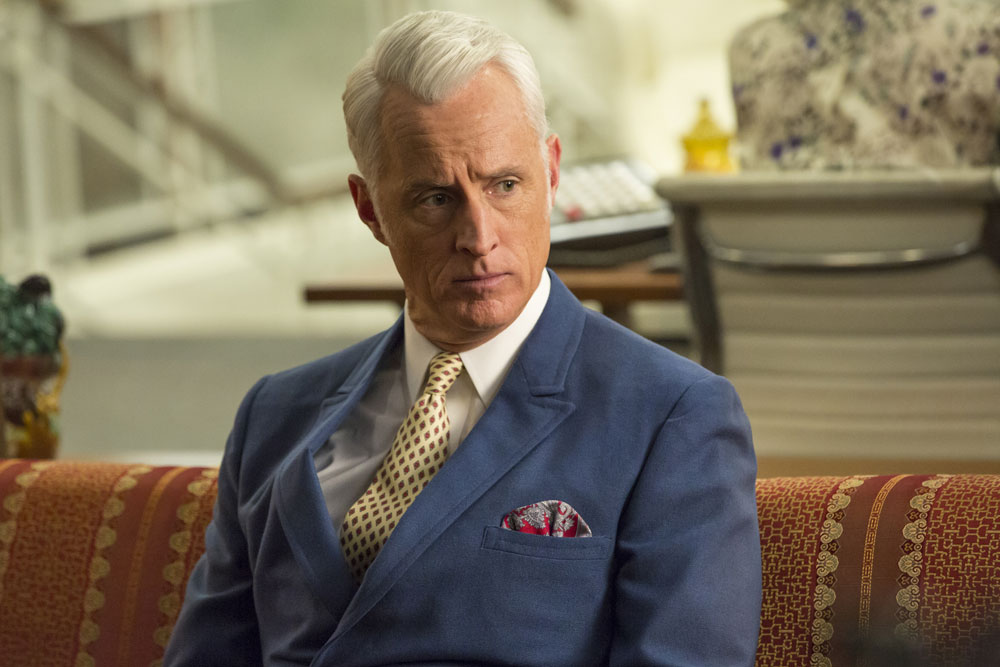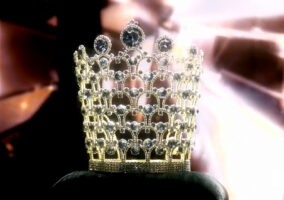 John Slattery in AMC’s “Mad Men”
John Slattery in AMC’s “Mad Men”
“We can have the connection that we’re hungry for.”
In the final episode of season 7.0 of Mad Men, (with season 7.1 scheduled for a year from now), people have either long moved on from Don Draper (“I’m starting to think of him as an old, bad boyfriend,” says Betty), are just starting to move on from Don Draper (“You don’t owe me anything,” says Megan), or want to move on from Don Draper but don’t manage it this time (“I’m tired of him costing me money,” says Joan. “You’re just a bully and a drunk.” spits Jim Cutler). Despite the surprisingly triumphant and upbeat ending (to the point of the show going wildly, exuberantly off-model in its last 3 minutes), Don is not ascendant as we leave him. In fact, a large part of the story had him handing off his duties to his former protege because unlike him, she is at the height of her abilities and still trending upward. Despite this last minute save, this is not the Don who kicked down Art Department doors in order to steal files and start his own agency. This is not Don the Rock Star anymore. All his enemies and antagonists were arrayed before him, just waiting for a Big-Dicked Don Draper moment where swagger and talent would win him the day once again – and it never came. Instead, for Don to triumph, he had to, as the kids say, get by with a little help from his friends. It wasn’t Don’s brilliant maneuvering or even his talent that saved him. It was Roger Sterling stepping up and winning the day for him. “And now I’m going to lose you too,” Roger says to Don, his voice cracking, after breaking the news of Bert Cooper’s death to him. He’s been in Don’s corner for a good portion of this season – and there was never any doubt that the two had a longstanding, if contentious, bond. But this episode revealed that Roger actually loves Don. Of course he had many reasons for pulling the brilliant, if a little insane, stunt that he did, but one of the chief motivators was the fact that his best friend was about to be kicked out of the company he helped found. Having lost his daughter and now his surrogate father, he can’t abide seeing his crazy-talented friend and cohort get taken away from him too.
But as we said, that wasn’t the only reason. Unfortunately for Roger, the man he looked on as a father pretty much told him he was a failure in his final words to him. “Whoever is in control is in charge,” says Bert to Roger, followed by a highly Bert-specific explanation of teams and loyalty and leadership, the final point being that Roger is not, in the eyes of Bert, a leader. Bert instead lavishes his final word of praise – and final word, period – on Neil Armstrong for the singular achievement of being the first man on the moon: “Bravo.” Alpha men, leaders and heroes were the kind of people Randian Bert Cooper admired most. To him, this specific brand of greatness was embodied in the figure of Armstrong. “She was an astronaut,” he said of his former lover Ida Blankenship when she died, paying her the highest compliment he could think of. The circle completes.
That sense of things coming full circle permeated the episode, which owed quite a bit to the season 3 finale “Shut the Door, Have a Seat,” when Don rallied the SC partners to escape the hell of working for McCann by forming their own agency. “You old men love building golden tombs and sealing the rest of us in with you” Don said to Bert in that episode. “I want to work,” he added, trying to convince Bert to not go gentle into that good night. “I want to build something of my own.” Compare that to what he says to Roger this episode: “I just want to do my work. I don’t want to deal with business anymore.” In many ways, Mad Men is about how people don’t fundamentally change; that the best they can do is learn to work within their own paradigm once they figure out who they are. Don is still largely the same person he was in 1963, making the same mistakes over and over again. But he actually has learned something in the ensuing years: he’s not a businessman and he should stay out of that side of the agency. He just wants to create, because that’s his true love and true calling.
Continuing that theme of people making the same mistakes, Don and Megan have a final phone call, putting the period at the end of the sentence that was their marriage; a direct callback to the scene in “Shut the Door, Have a Seat,” when Don called Betty to tell her he won’t fight the divorce. “You’ll always be their father,” she tells him as a goodbye. “You don’t owe me anything,” says Megan as hers. But there is cause for hope. Don walked out of that Ossining house that last night after roughing Betty up and calling her a whore and a spoiled bitch. At least he ends his marriages like a grownup now. “Aren’t you tired of fighting?” asks Megan. And the truth of the matter is, he is.
But if there’s one thing the creative team on Mad Men knows how to do, it’s pay off a story. The solution to Don’s problem came in the form of Roger saving the agency by appealing to the man who inspired its formation in the first place; the man they were all desperate not to have to work for: Jim Hobart of McCann Erickson. Lane Pryce must have been spinning in his grave. It’s a wonder his ghost doesn’t haunt that office. But as we said, there were many factors inspiring Roger’s little coup, not the least of which was the rather pointed question he asked Joan: “Is this what would happen if I died?” Would they all immediately gather over his corpse and discuss matters of business? Yet another callback: the night Roger had his heart attack and Joan came to the office at Bert’s request to compose telegrams to all their clients. Not quite so mercenary an act as Jim Cutler’s power play over Bert’s cooling corpse, but Joan must have been reminded of the time business sprung into action in the middle of the night when it looked like a partner might die.
In other news – and in a way, another callback – Peggy finally has her Carousel moment with Burger Chef, delivering a pitch every bit as emotional and stirring as the one Don did all those years ago for Kodak. She had everyone in that conference room eating out of her hand, and if she wanted to, she could have gotten half of them to burst into tears with just the power of her words and the sound of her voice. But crying executives don’t sign contracts, so instead she appealed to their pride and the idea that their fast food chain is capable of providing something akin to a religious experience. This was a spectacular scene, partially because of the looks traded between Don and Peggy throughout the meeting; the secret, unspoken language they use, the little nods and smiles that only they can see. “I got this.” “Yes you do. Bring it home.” They’re fully equals now. Like Don did with his Carousel pitch, Peggy splices in bits and pieces from her own life, mentioning Julio back home in front of her TV (but leaving out exactly who he is to her) and even painting a family picture with “Dad likes Sinatra,” calling back to the pseudo father-daughter dance she shared with Don to “My Way.” But because they’re equals now, Don steals directly from her too, using the exact introduction she composed in the run-through meeting: “Every great ad tells a story. Here to tell that story is Peggy Olson.” Maybe Don has changed; at least in this one area of his life, with this one person. His insistence that Peggy do the Burger Chef pitch – when his own fate was up in the air and a classic Don Draper pitch could only help his chances at the moment – was as pure an act of selflessness as anything we’ve ever seen from him. Much as Roger loves Don and fought on his behalf, Don in turn loves Peggy; enough to sacrifice his own chance at a Hail Mary pass, not only because she deserves this shot, but also because she’s the best person for the job. There’s no way Don could’ve beaten that pitch.
But not everyone’s feeling the love right now. Joan has dug in her kitten heels and won’t budge an inch when it comes to Don Draper. We wish we could say this was an instance of the show paying itself off in a satisfying manner, but to us, it still comes off as a badly written character turn. It’s too simplistic to say, as Bert did by way of explanation for her anger, that Don “cost her a million dollars” by scuttling the public offering. He didn’t even know there was a public offering because half the partners – Joan included – were pursuing it in secret. It’s interesting to note – and boy, was Roger gleeful about informing her of this fact – that she stands to make an equivalent chunk of change with the McCann buyout, which is entirely dependent on Don Draper being part of the deal. Who will be the one to point out to her that her wealth is due to in large part to Don’s talent and reputation? We hope it’s Don, because he looked alternately hurt and furious with her this episode.
Meanwhile, off in Rye, Sally Draper has yet another milestone in her life – and it’s a surprising one. For all her Betty-like affectations, like the suddenly huge hair and the dead-on cigarette-smoking mimicry, Sally is not her mother. She doesn’t go for the alpha male football player in front of her. She goes for the smart, quiet, nerdy guy. Never in a million years would Betty Hofstadt ever have kissed a boy like that. Interestingly, she originally seemed to be more interested in the pinup brother, going so far as to repeat his thoughts on the space program to Don seconds after he uttered them. But Don took his daughter to task for being too cynical and a bad influence on her younger brothers. Sally didn’t like hearing that – because what teenager ever likes hearing parental criticism? But suddenly she’s out in the backyard showing a sudden interest in the stars with a nerdy boy named Neil, instead of watching a square-jawed hero named Neil make history on TV. Inadvertently, Don essentially steered his daughter away from guys like him. She skipped the swagger and went for brains and sensitivity instead, forging a path inspired by, but entirely separate from her parents’. She’s going to be fine.
Many other things happened, like Peggy meeting the next guy she’s going to have sex with (we hope), Ted trying to kill himself in the middle of a client meeting, Pete doing outrage the way only Pete can, sputtering the soon-to-be immortal lines, “That is a very sensitive piece of horseflesh! He shouldn’t be rattled!” Harry getting shut out of a partnership once again, and Peggy saying goodbye to her own surrogate child, but that’s all stuff we can cover in our Mad Style post on Wednesday. What’s more important is that Robert Morse got the “How To Succeed in Business Without Really Trying” sendoff the show creators felt this song and dance man deserved. As we said above, it was wildly off model for the show (even though the series had more than its share of musical moments), but it was so full of genuine love and respect for the actor that we can’t complain. It was utterly charming, if utterly unexpected. After all, Bert’s final interactions in the story were decidedly negative, telling Roger he wasn’t a leader and essentially suggesting to Don that he kill himself and save the agency a lot of bother. But here he was, happily singing and dancing his way to heaven, reminding Don that the best things in life are free. Why? Because his work is done. Don finally understands loyalty and Roger is finally a leader. He’s raised his boys.
EDITED TO ADD: Tom did a bleary-eyed, coffee fueled turn on the “Talking TV with Ryan & Ryan” podcast, with Mo Ryan and Ryan McGee, discussing this episode and expanding on some of the stuff in this review. You can listen to the whole thing at the bottom of Mo’s very fine review of the episode here.
[Photo Credit: Michael Yarish/AMC]
Joe Manganiello Grabs Breakfast in Los Feliz Next Post:
Orphan Black: To Hound Nature in Her Wanderings
Please review our Community Guidelines before posting a comment. Thank you!



